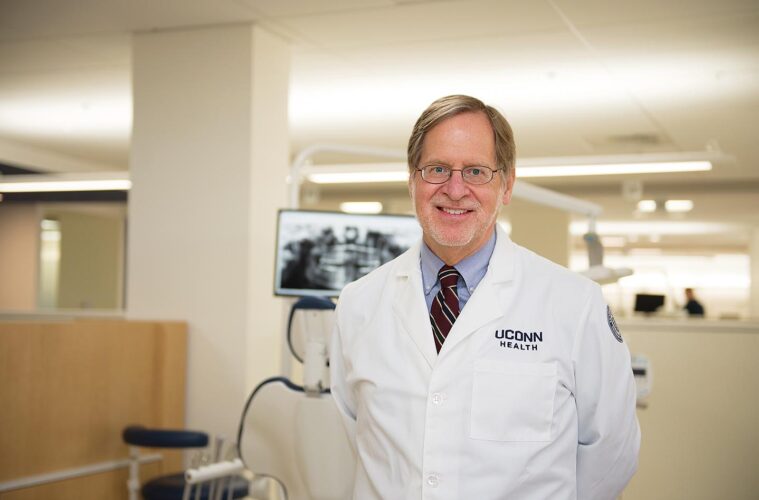They say the eyes are the window to the soul, but Doug Peterson ’69 is more interested in the mouth. The connection between a person’s oral health and the health of their entire body is what drew him into a career in the medicine of the mouth. Peterson is a professor of oral medicine at the University of Connecticut School of Dental Medicine, where he’s taught for more than three decades. This year, Peterson’s peers recognized his work with a pair of major international awards.
“My grandfather was a dentist in Iowa, and I pictured myself having a solo general dental practice,” Peterson says. But when he began studying oncology and oral medicine at the University of Pennsylvania School of Dental Medicine, he wanted to learn more. He focused his studies on the links between cancer, its treatment, and oral health and disease.
When cancer patients receive high-dose radiation therapy to their head and neck, Peterson explains, they may suffer side effects that are separate from the cancer itself. These effects may be frustrating, such as taste disturbance: “They can’t enjoy a meal because things taste flat, or there’s distorted taste,” Peterson says. Or tightness in the jaw muscles can make it difficult for someone to open their mouth. Both of these conditions can last for the rest of the patient’s life.
Some of the side effects may be more medically serious and expensive to manage. Decreased salivation can make patients prone to infection. In addition, nearly all of these patients develop severe sores in their mouths. This condition can be so painful that patients end up in the hospital, being fed intravenously because they can’t eat or swallow.
When Peterson started his career, physicians and dentists recognized these problems but didn’t always have the tools to address them. Peterson recalls seeing a letter written by two oncologists for a prestigious medical journal in the 1970s, suggesting that oncologists might lessen side effects in leukemia patients by simply removing all their teeth before starting chemotherapy.
Clearly cancer patients needed better options, but health care professionals didn’t yet know how to best help them. “I wanted to contribute,” he says.
Decades later, Peterson says he’s seen “tremendous progress” in the field. “It really comes from people understanding why this is so important clinically,” he explains. His own research in recent years has focused on reviewing scientific evidence and developing international guidelines for those caring for cancer patients. These days, teams that include oncologists, dentists, nurses, nutritionists, and social workers can work together with patients to prevent radiation side effects or address them early.
For his work, Peterson received the King James IV Professorship, an award from the Royal College of Surgeons/Edinburgh, earlier this year. He was also named a 2022 Fellow of the American Society of Clinical Oncology — the first person with a dental degree to receive that award since its creation in 2007.
Many open questions remain in the field, Peterson says. For example, scientists are trying to figure out whether some of radiation’s harmful side effects actually result from changes in the microorganisms that naturally live in patients’ mouths. To solve these puzzles and improve patients’ lives, “We need to continue to combine forces across professions,” he says.
Peterson himself will be stepping back; he officially retired in July of this year. But it might be hard to tell. He plans to continue mentoring, teaching, managing patients, and working on guidelines as a “retiree — I’m still getting used to saying that,” Peterson says.

